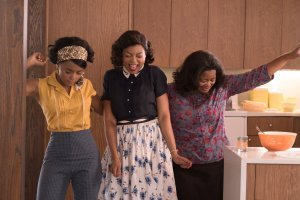Hidden Figures
Meet the women you don't know, behind the mission you do.

|
Hidden Figures follows the untold story of the three black women at NASA who were instrumental in the success of Apollo 11 during the Space Race. Katherine Johnson (Taraji P. Henson), Dorothy Vaughn (Octavia Spencer) and Mary Jackson (Janelle Monáe) must navigate the extremely white male dominated spheres of mathematics and engineering in a race against time to put man on the moon before the Russians. Facing discrimination because of their race and gender, these women must overcome various barriers throughout the film, including having to walk across campus to use the bathroom and drinking from different coffee pots, culminating in a powerful speech, delivered by Henson, about the prevalent double standards and higher expectations placed on her, as opposed to those of her white male counterparts.
The story is inspiring and uplifting and highlights the often overlooked experiences of black women in America, especially in the context of notoriously male dominated spheres like STEM
Sophie Cooper
Hidden Figures is an American biographical comedy drama which tells the amazing story of Katherine Goble (Taraji P. Henson), Dorothy Vaughan (Octavia Spencer) and Mary Jackson (Janelle Monáe); three African American mathematicians who worked at NASA during the Space Race and were invaluable in helping launch astronaut John Glenn into orbit in 1962, the first human spaceflight of the program. The USSR had launched Sputnik in 1957, the first artificial satellite, giving them a big head start and therefore putting pressure on the Americans. To increase the efficiency of their programme NASA had to try and overcome the barriers of racism and sexism holding back some of their most talented employees, themes which are boldly addressed within the film as the potency of normalising white supremacy is unveiled as the ambitious trio jostle against it.
The writers Theodore Melfi and Allison Schroeder base their story loosely on the novel by Margot Lee Shetterly to give a story of triumph aiming to inspire, empower and educate the audience. The film seeks to give credit to the marginalised and underappreciated women at NASA, acknowledging their bravery and talent in the effort to overcome racism, whilst safely staying within established film conventions. However the predictability of the film doesn’t prevent it from being an emotional story focusing on the everyday which helps to give a new perspective to the Space Race.
Alice SaundersMore Information | Back to Previous Schedule | This Season | BBFC Classification Guidelines
Screenings of this film:
| 2016/2017 Summer Term – (digital) |
| 2016/2017 Summer Term – (digital) |
| 2019/2020 Spring Term – (digital) |
| 2023/2024 Autumn Term – (digital) |


